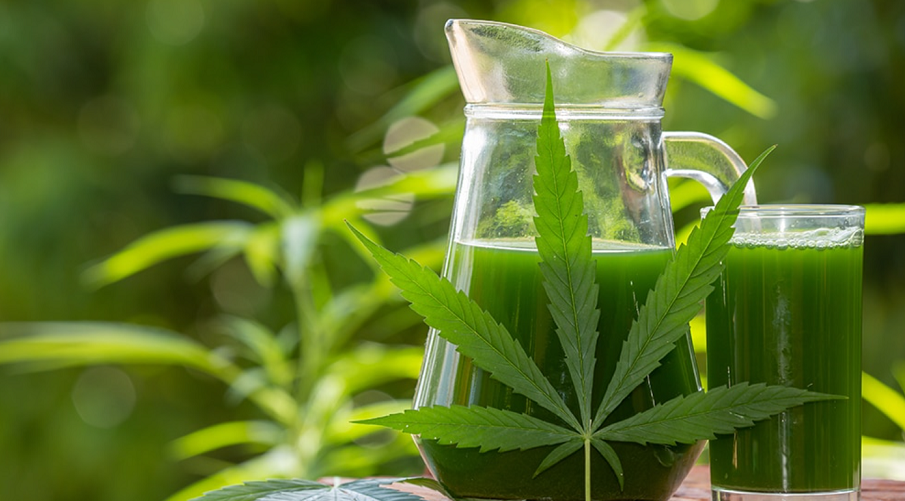Fun fact: Contrary to public opinion and what most movies portray, you will not get high when you eat raw weed leaves.
Even though the marijuana plant may contain a lot of potential, it won’t have any intoxicating effects if it’s still raw.
What you are actually consuming is THCA flower, which is non psychoactive.
So you won’t get high or feel intoxicated.
The actual cannabinoid that provides the intoxicating feel is THC.
You won’t find it naturally in the marijuana plant.
Instead, it develops through a decarboxylation process.
Some people who use cannabis may not know much about THCA.
So let’s clear that up.
This article explores the differences between THCA and THC and sheds light on their respective uses.
THC vs. THCA Flower:

The Basics
THCA (short for tetrahydrocannabolic acid) and THC (tetrahydrocannabinol) are both of the numerous cannabinoids that come from the cannabis plant.
They are similar yet not the same.
THCA occurs naturally in the trichome of the plant.
It is more abundant than other cannabinoids that the plant produces.
Whereas, THC does not come naturally, but is formed when THCA undergoes decarboxylation.
Decarboxylation removes one carboxylic acid group from the molecule.
The Differences
So what sets THCA and THC apart from each other now that we have a grasp of their definitions?
For starters, we cannot have THC without first having THCA.
When THCA is exposed to heat or light, it quickly undergoes decarboxylation.
It loses its carboxylic acid group, changing it to THC.
THCA cannot produce intoxicating effects, but THC can make you feel trippy.
THC has a smaller shape, so it binds to the CB1 receptors.
In contrast, THCA is slightly larger because of the additional carboxylic acid molecule.
This prevents it from fitting directly into the CB1 receptors.
So it will not cause a psychoactive effect.
Uses of THC and THCA
THCA and THC have similar therapeutic potential for the human body.
Suppose you want to experience the medicinal benefits without the psychoactive effects.
In that case, THCA is the way to go.
But, if you’re looking for a combination of both recreational and medical benefits, THC will be the perfect choice for you.
Let’s get started.
1. Pain Management
The interaction of THC and THCA with the endocannabinoid system (ECS) can help people who suffer from chronic pain.
However, they produce this effect in different ways.
THC binds directly to the CB1 receptors.
This allows it to reduce pain perception and increase tolerance.
It influences the transmission of pain signals to the brain.
This causes the person to feel less pain.
Also, the ability of THC to cause psychoactive effects further enhances its pain management potential.
It can potentially shift a person’s focus from pain, providing a temporary distraction from their discomfort.
As stated earlier, THCA does not attach to the CB1 receptors.
It, however, provides its pain relieving effects through its interaction with other receptors like the TRPV1 receptor.
It may also help reduce pain caused by inflammation due to its potential anti inflammatory properties.
2. Nausea and Appetite Regulation
Both THC and THC can be helpful for people who struggle with nausea or appetite disorder, perhaps due to a medical condition or treatment plan.
They both activate receptors that can help a person to eat more.
For instance, the actions of both cannabinoids can increase the production of ghrelin, the hunger hormone.
Ghrelin is a hormone that makes you feel hungry.
The more ghrelin you have in your body, the hungrier you will feel.
By elevating ghrelin levels, they can help you to eat more.
They can also help you to keep food down.
They modulate receptors that regulate gut functions to help you withstand triggers that cause vomiting.
Both cannabinoids are effective for nausea.
However, a 2013 study confirms that THCA is a more potent ant nausea agent than THC.
3. Neuroprotection
Both THCA and THC have neuroprotective properties.
They can support brain function, protect against neurological damage, and promote brain health.
They eliminate free oxygen radicals which may cause cellular damage in the brain.
Studies confirm that the interaction of cannabinoids with the ECS can slow the progress of neurodegenerative conditions like Alzheimer’s and Parkinson’s diseases.
We do not advise or promote the usage of cannabis. We are just sharing information that some readers might find helpful. It’s always the smartest decision to consult with your doctor before making an important decision for your health.






